A Sociological Analysis of Social Determinants of Health Models
VerifiedAdded on 2023/06/14
|7
|2131
|174
Essay
AI Summary
This essay provides an overview of social determinants of health from a sociological perspective, focusing on how social conditions influence health inequalities. It examines two sociological theories: conflict theory, which highlights economic and political structures that create social divisions, and symbolic interactionism, which emphasizes health as a social construct. The essay contrasts these sociological models with the medical model of health, which primarily focuses on biomedical treatments. It argues that while the medical model treats illness with medication, sociological models consider broader social and economic factors contributing to health issues, ultimately advocating for a more holistic approach to understanding and addressing health determinants. Desklib offers a variety of study tools and solved assignments for students.
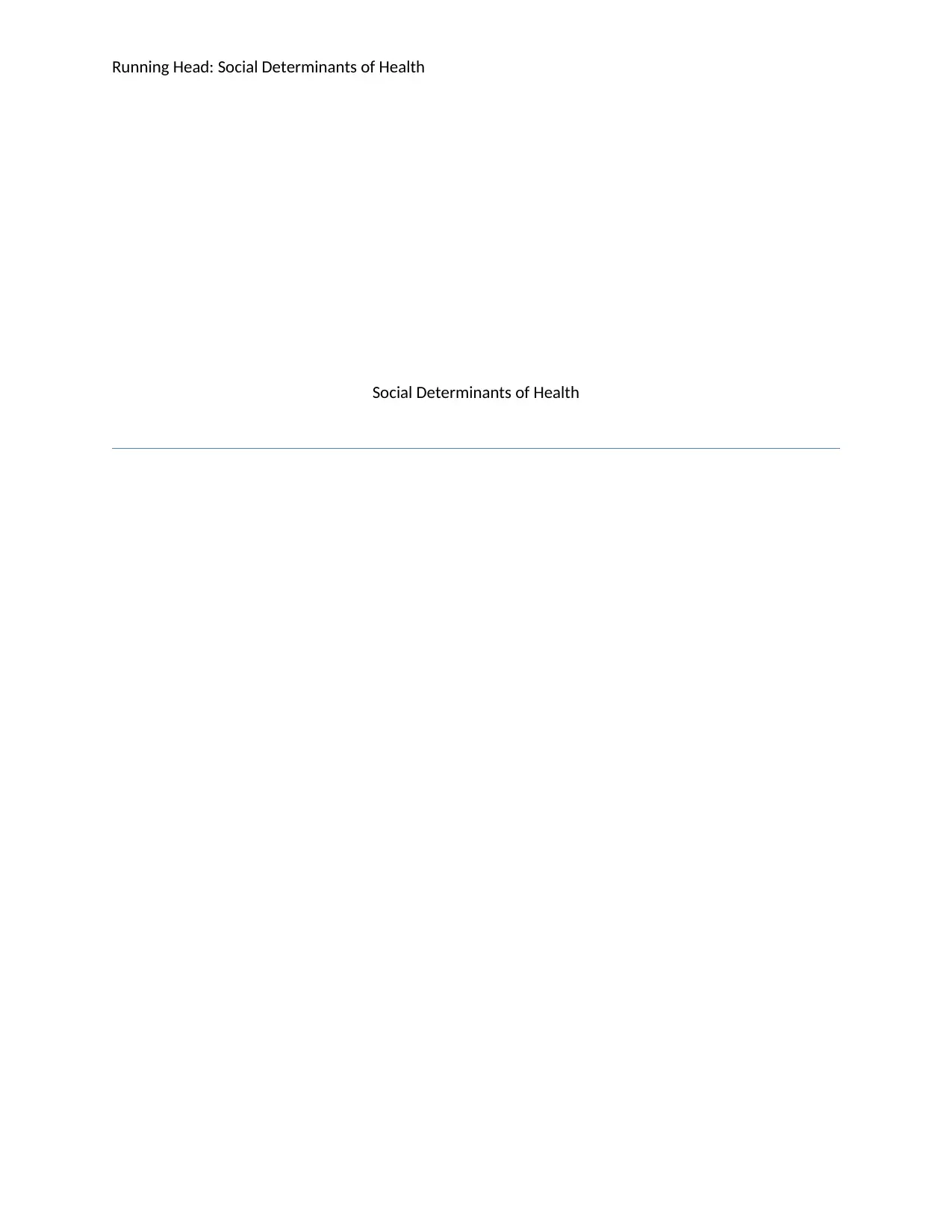
Running Head: Social Determinants of Health
Social Determinants of Health
Social Determinants of Health
Paraphrase This Document
Need a fresh take? Get an instant paraphrase of this document with our AI Paraphraser
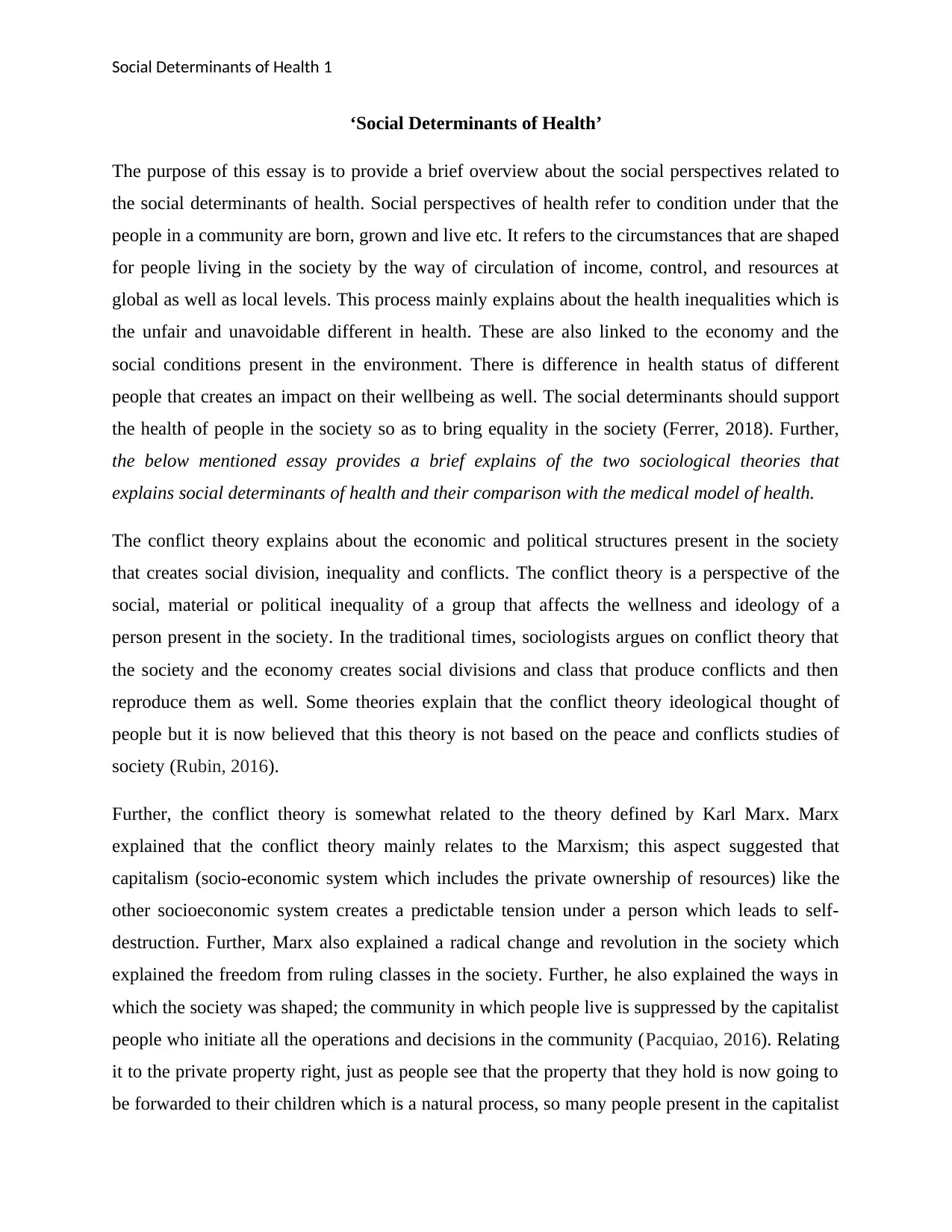
Social Determinants of Health 1
‘Social Determinants of Health’
The purpose of this essay is to provide a brief overview about the social perspectives related to
the social determinants of health. Social perspectives of health refer to condition under that the
people in a community are born, grown and live etc. It refers to the circumstances that are shaped
for people living in the society by the way of circulation of income, control, and resources at
global as well as local levels. This process mainly explains about the health inequalities which is
the unfair and unavoidable different in health. These are also linked to the economy and the
social conditions present in the environment. There is difference in health status of different
people that creates an impact on their wellbeing as well. The social determinants should support
the health of people in the society so as to bring equality in the society (Ferrer, 2018). Further,
the below mentioned essay provides a brief explains of the two sociological theories that
explains social determinants of health and their comparison with the medical model of health.
The conflict theory explains about the economic and political structures present in the society
that creates social division, inequality and conflicts. The conflict theory is a perspective of the
social, material or political inequality of a group that affects the wellness and ideology of a
person present in the society. In the traditional times, sociologists argues on conflict theory that
the society and the economy creates social divisions and class that produce conflicts and then
reproduce them as well. Some theories explain that the conflict theory ideological thought of
people but it is now believed that this theory is not based on the peace and conflicts studies of
society (Rubin, 2016).
Further, the conflict theory is somewhat related to the theory defined by Karl Marx. Marx
explained that the conflict theory mainly relates to the Marxism; this aspect suggested that
capitalism (socio-economic system which includes the private ownership of resources) like the
other socioeconomic system creates a predictable tension under a person which leads to self-
destruction. Further, Marx also explained a radical change and revolution in the society which
explained the freedom from ruling classes in the society. Further, he also explained the ways in
which the society was shaped; the community in which people live is suppressed by the capitalist
people who initiate all the operations and decisions in the community (Pacquiao, 2016). Relating
it to the private property right, just as people see that the property that they hold is now going to
be forwarded to their children which is a natural process, so many people present in the capitalist
‘Social Determinants of Health’
The purpose of this essay is to provide a brief overview about the social perspectives related to
the social determinants of health. Social perspectives of health refer to condition under that the
people in a community are born, grown and live etc. It refers to the circumstances that are shaped
for people living in the society by the way of circulation of income, control, and resources at
global as well as local levels. This process mainly explains about the health inequalities which is
the unfair and unavoidable different in health. These are also linked to the economy and the
social conditions present in the environment. There is difference in health status of different
people that creates an impact on their wellbeing as well. The social determinants should support
the health of people in the society so as to bring equality in the society (Ferrer, 2018). Further,
the below mentioned essay provides a brief explains of the two sociological theories that
explains social determinants of health and their comparison with the medical model of health.
The conflict theory explains about the economic and political structures present in the society
that creates social division, inequality and conflicts. The conflict theory is a perspective of the
social, material or political inequality of a group that affects the wellness and ideology of a
person present in the society. In the traditional times, sociologists argues on conflict theory that
the society and the economy creates social divisions and class that produce conflicts and then
reproduce them as well. Some theories explain that the conflict theory ideological thought of
people but it is now believed that this theory is not based on the peace and conflicts studies of
society (Rubin, 2016).
Further, the conflict theory is somewhat related to the theory defined by Karl Marx. Marx
explained that the conflict theory mainly relates to the Marxism; this aspect suggested that
capitalism (socio-economic system which includes the private ownership of resources) like the
other socioeconomic system creates a predictable tension under a person which leads to self-
destruction. Further, Marx also explained a radical change and revolution in the society which
explained the freedom from ruling classes in the society. Further, he also explained the ways in
which the society was shaped; the community in which people live is suppressed by the capitalist
people who initiate all the operations and decisions in the community (Pacquiao, 2016). Relating
it to the private property right, just as people see that the property that they hold is now going to
be forwarded to their children which is a natural process, so many people present in the capitalist
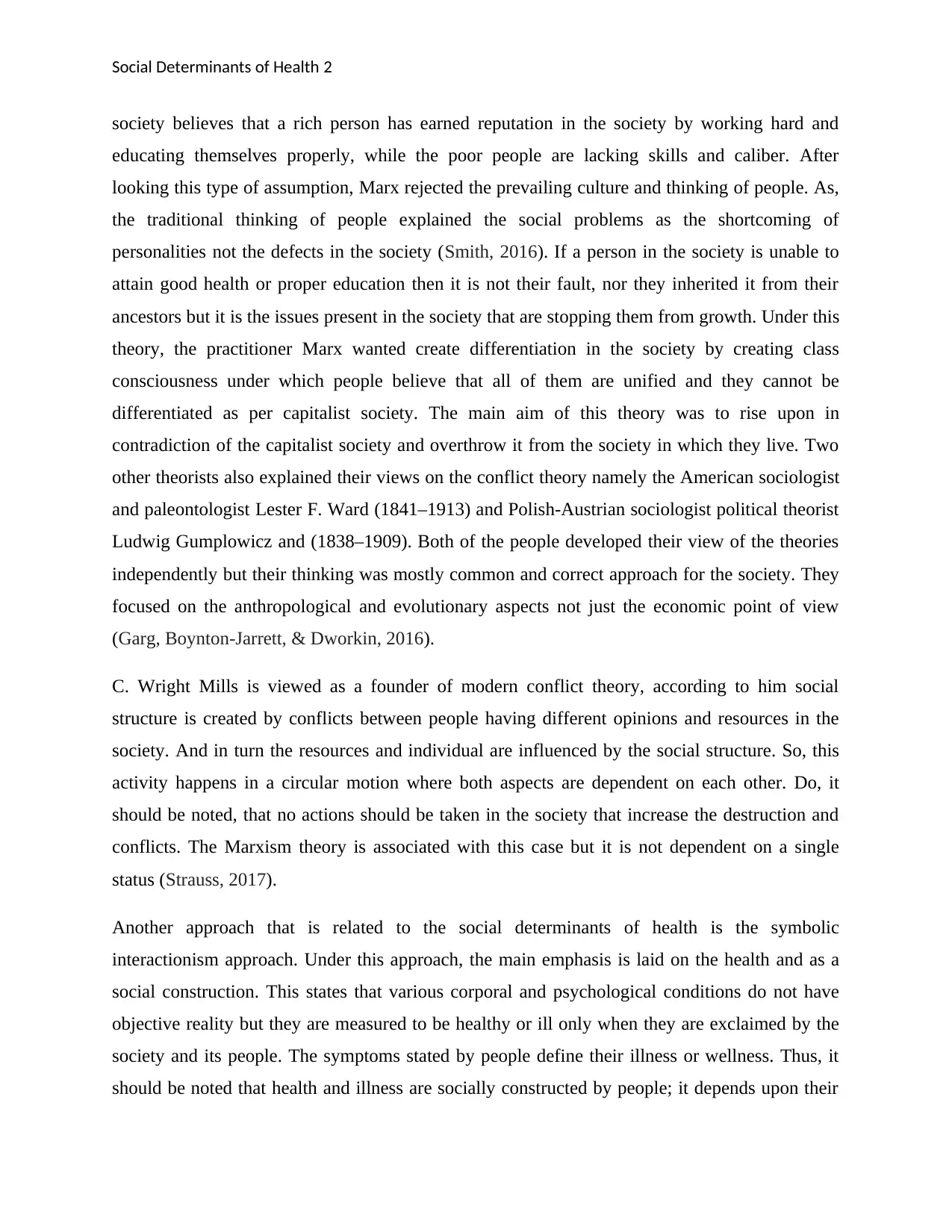
Social Determinants of Health 2
society believes that a rich person has earned reputation in the society by working hard and
educating themselves properly, while the poor people are lacking skills and caliber. After
looking this type of assumption, Marx rejected the prevailing culture and thinking of people. As,
the traditional thinking of people explained the social problems as the shortcoming of
personalities not the defects in the society (Smith, 2016). If a person in the society is unable to
attain good health or proper education then it is not their fault, nor they inherited it from their
ancestors but it is the issues present in the society that are stopping them from growth. Under this
theory, the practitioner Marx wanted create differentiation in the society by creating class
consciousness under which people believe that all of them are unified and they cannot be
differentiated as per capitalist society. The main aim of this theory was to rise upon in
contradiction of the capitalist society and overthrow it from the society in which they live. Two
other theorists also explained their views on the conflict theory namely the American sociologist
and paleontologist Lester F. Ward (1841–1913) and Polish-Austrian sociologist political theorist
Ludwig Gumplowicz and (1838–1909). Both of the people developed their view of the theories
independently but their thinking was mostly common and correct approach for the society. They
focused on the anthropological and evolutionary aspects not just the economic point of view
(Garg, Boynton-Jarrett, & Dworkin, 2016).
C. Wright Mills is viewed as a founder of modern conflict theory, according to him social
structure is created by conflicts between people having different opinions and resources in the
society. And in turn the resources and individual are influenced by the social structure. So, this
activity happens in a circular motion where both aspects are dependent on each other. Do, it
should be noted, that no actions should be taken in the society that increase the destruction and
conflicts. The Marxism theory is associated with this case but it is not dependent on a single
status (Strauss, 2017).
Another approach that is related to the social determinants of health is the symbolic
interactionism approach. Under this approach, the main emphasis is laid on the health and as a
social construction. This states that various corporal and psychological conditions do not have
objective reality but they are measured to be healthy or ill only when they are exclaimed by the
society and its people. The symptoms stated by people define their illness or wellness. Thus, it
should be noted that health and illness are socially constructed by people; it depends upon their
society believes that a rich person has earned reputation in the society by working hard and
educating themselves properly, while the poor people are lacking skills and caliber. After
looking this type of assumption, Marx rejected the prevailing culture and thinking of people. As,
the traditional thinking of people explained the social problems as the shortcoming of
personalities not the defects in the society (Smith, 2016). If a person in the society is unable to
attain good health or proper education then it is not their fault, nor they inherited it from their
ancestors but it is the issues present in the society that are stopping them from growth. Under this
theory, the practitioner Marx wanted create differentiation in the society by creating class
consciousness under which people believe that all of them are unified and they cannot be
differentiated as per capitalist society. The main aim of this theory was to rise upon in
contradiction of the capitalist society and overthrow it from the society in which they live. Two
other theorists also explained their views on the conflict theory namely the American sociologist
and paleontologist Lester F. Ward (1841–1913) and Polish-Austrian sociologist political theorist
Ludwig Gumplowicz and (1838–1909). Both of the people developed their view of the theories
independently but their thinking was mostly common and correct approach for the society. They
focused on the anthropological and evolutionary aspects not just the economic point of view
(Garg, Boynton-Jarrett, & Dworkin, 2016).
C. Wright Mills is viewed as a founder of modern conflict theory, according to him social
structure is created by conflicts between people having different opinions and resources in the
society. And in turn the resources and individual are influenced by the social structure. So, this
activity happens in a circular motion where both aspects are dependent on each other. Do, it
should be noted, that no actions should be taken in the society that increase the destruction and
conflicts. The Marxism theory is associated with this case but it is not dependent on a single
status (Strauss, 2017).
Another approach that is related to the social determinants of health is the symbolic
interactionism approach. Under this approach, the main emphasis is laid on the health and as a
social construction. This states that various corporal and psychological conditions do not have
objective reality but they are measured to be healthy or ill only when they are exclaimed by the
society and its people. The symptoms stated by people define their illness or wellness. Thus, it
should be noted that health and illness are socially constructed by people; it depends upon their
⊘ This is a preview!⊘
Do you want full access?
Subscribe today to unlock all pages.

Trusted by 1+ million students worldwide
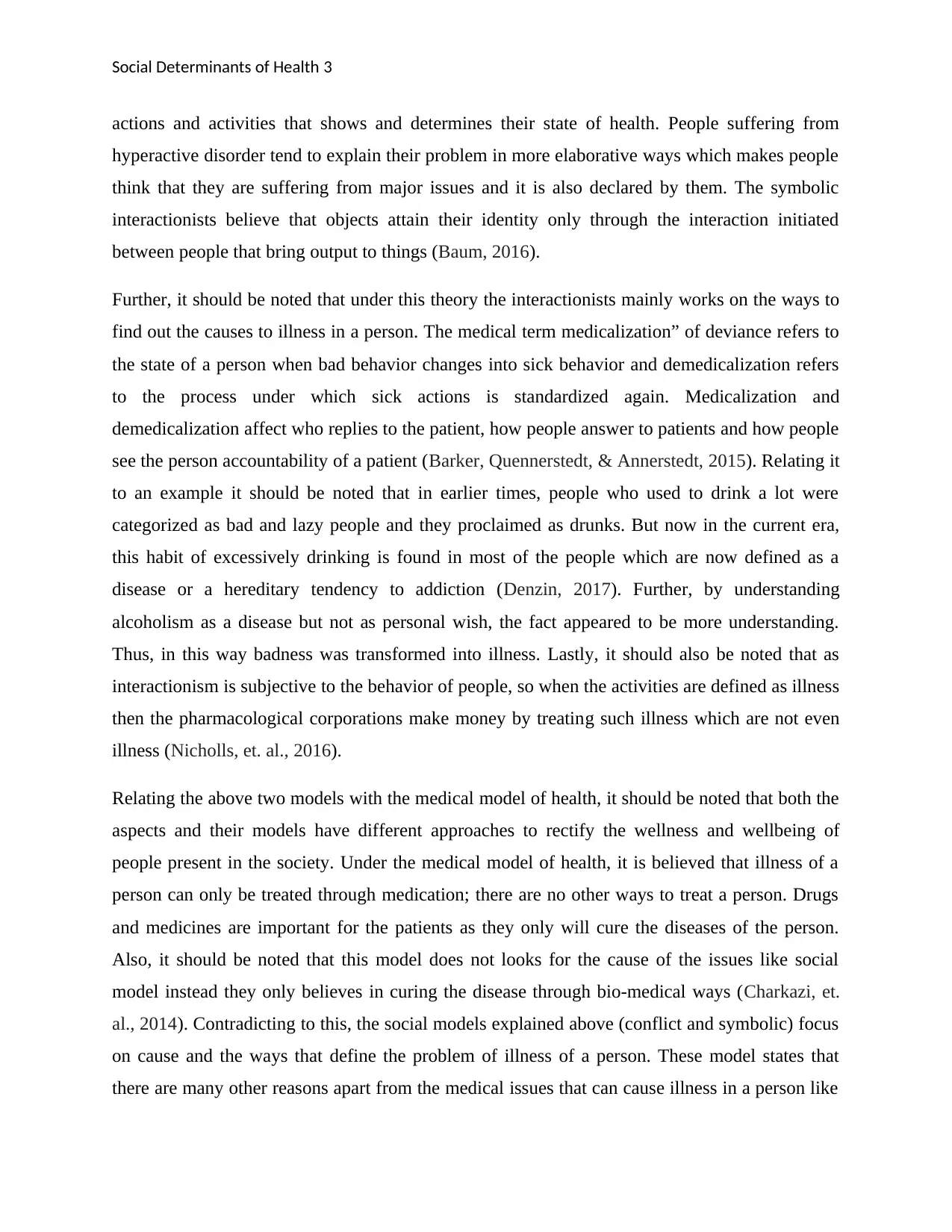
Social Determinants of Health 3
actions and activities that shows and determines their state of health. People suffering from
hyperactive disorder tend to explain their problem in more elaborative ways which makes people
think that they are suffering from major issues and it is also declared by them. The symbolic
interactionists believe that objects attain their identity only through the interaction initiated
between people that bring output to things (Baum, 2016).
Further, it should be noted that under this theory the interactionists mainly works on the ways to
find out the causes to illness in a person. The medical term medicalization” of deviance refers to
the state of a person when bad behavior changes into sick behavior and demedicalization refers
to the process under which sick actions is standardized again. Medicalization and
demedicalization affect who replies to the patient, how people answer to patients and how people
see the person accountability of a patient (Barker, Quennerstedt, & Annerstedt, 2015). Relating it
to an example it should be noted that in earlier times, people who used to drink a lot were
categorized as bad and lazy people and they proclaimed as drunks. But now in the current era,
this habit of excessively drinking is found in most of the people which are now defined as a
disease or a hereditary tendency to addiction (Denzin, 2017). Further, by understanding
alcoholism as a disease but not as personal wish, the fact appeared to be more understanding.
Thus, in this way badness was transformed into illness. Lastly, it should also be noted that as
interactionism is subjective to the behavior of people, so when the activities are defined as illness
then the pharmacological corporations make money by treating such illness which are not even
illness (Nicholls, et. al., 2016).
Relating the above two models with the medical model of health, it should be noted that both the
aspects and their models have different approaches to rectify the wellness and wellbeing of
people present in the society. Under the medical model of health, it is believed that illness of a
person can only be treated through medication; there are no other ways to treat a person. Drugs
and medicines are important for the patients as they only will cure the diseases of the person.
Also, it should be noted that this model does not looks for the cause of the issues like social
model instead they only believes in curing the disease through bio-medical ways (Charkazi, et.
al., 2014). Contradicting to this, the social models explained above (conflict and symbolic) focus
on cause and the ways that define the problem of illness of a person. These model states that
there are many other reasons apart from the medical issues that can cause illness in a person like
actions and activities that shows and determines their state of health. People suffering from
hyperactive disorder tend to explain their problem in more elaborative ways which makes people
think that they are suffering from major issues and it is also declared by them. The symbolic
interactionists believe that objects attain their identity only through the interaction initiated
between people that bring output to things (Baum, 2016).
Further, it should be noted that under this theory the interactionists mainly works on the ways to
find out the causes to illness in a person. The medical term medicalization” of deviance refers to
the state of a person when bad behavior changes into sick behavior and demedicalization refers
to the process under which sick actions is standardized again. Medicalization and
demedicalization affect who replies to the patient, how people answer to patients and how people
see the person accountability of a patient (Barker, Quennerstedt, & Annerstedt, 2015). Relating it
to an example it should be noted that in earlier times, people who used to drink a lot were
categorized as bad and lazy people and they proclaimed as drunks. But now in the current era,
this habit of excessively drinking is found in most of the people which are now defined as a
disease or a hereditary tendency to addiction (Denzin, 2017). Further, by understanding
alcoholism as a disease but not as personal wish, the fact appeared to be more understanding.
Thus, in this way badness was transformed into illness. Lastly, it should also be noted that as
interactionism is subjective to the behavior of people, so when the activities are defined as illness
then the pharmacological corporations make money by treating such illness which are not even
illness (Nicholls, et. al., 2016).
Relating the above two models with the medical model of health, it should be noted that both the
aspects and their models have different approaches to rectify the wellness and wellbeing of
people present in the society. Under the medical model of health, it is believed that illness of a
person can only be treated through medication; there are no other ways to treat a person. Drugs
and medicines are important for the patients as they only will cure the diseases of the person.
Also, it should be noted that this model does not looks for the cause of the issues like social
model instead they only believes in curing the disease through bio-medical ways (Charkazi, et.
al., 2014). Contradicting to this, the social models explained above (conflict and symbolic) focus
on cause and the ways that define the problem of illness of a person. These model states that
there are many other reasons apart from the medical issues that can cause illness in a person like
Paraphrase This Document
Need a fresh take? Get an instant paraphrase of this document with our AI Paraphraser
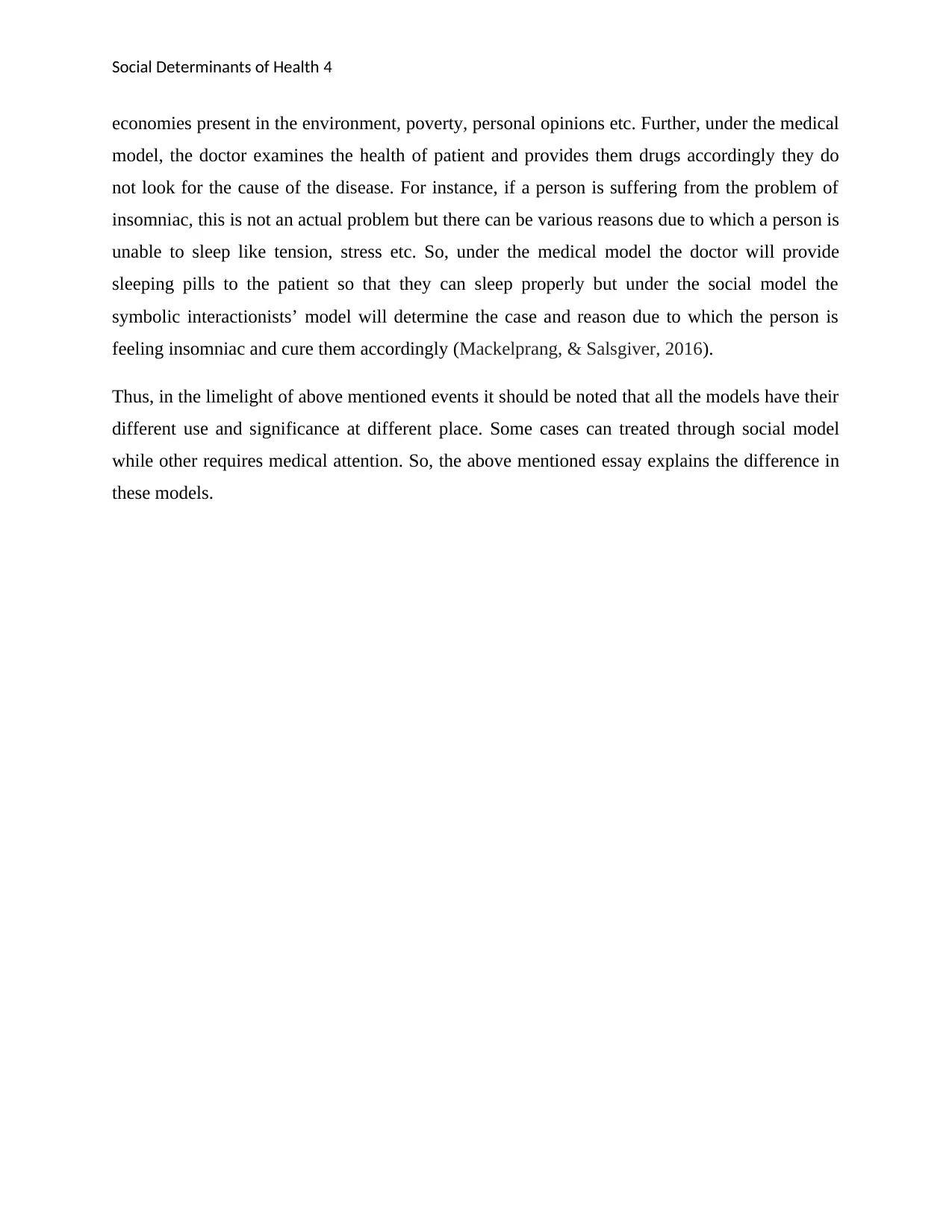
Social Determinants of Health 4
economies present in the environment, poverty, personal opinions etc. Further, under the medical
model, the doctor examines the health of patient and provides them drugs accordingly they do
not look for the cause of the disease. For instance, if a person is suffering from the problem of
insomniac, this is not an actual problem but there can be various reasons due to which a person is
unable to sleep like tension, stress etc. So, under the medical model the doctor will provide
sleeping pills to the patient so that they can sleep properly but under the social model the
symbolic interactionists’ model will determine the case and reason due to which the person is
feeling insomniac and cure them accordingly (Mackelprang, & Salsgiver, 2016).
Thus, in the limelight of above mentioned events it should be noted that all the models have their
different use and significance at different place. Some cases can treated through social model
while other requires medical attention. So, the above mentioned essay explains the difference in
these models.
economies present in the environment, poverty, personal opinions etc. Further, under the medical
model, the doctor examines the health of patient and provides them drugs accordingly they do
not look for the cause of the disease. For instance, if a person is suffering from the problem of
insomniac, this is not an actual problem but there can be various reasons due to which a person is
unable to sleep like tension, stress etc. So, under the medical model the doctor will provide
sleeping pills to the patient so that they can sleep properly but under the social model the
symbolic interactionists’ model will determine the case and reason due to which the person is
feeling insomniac and cure them accordingly (Mackelprang, & Salsgiver, 2016).
Thus, in the limelight of above mentioned events it should be noted that all the models have their
different use and significance at different place. Some cases can treated through social model
while other requires medical attention. So, the above mentioned essay explains the difference in
these models.
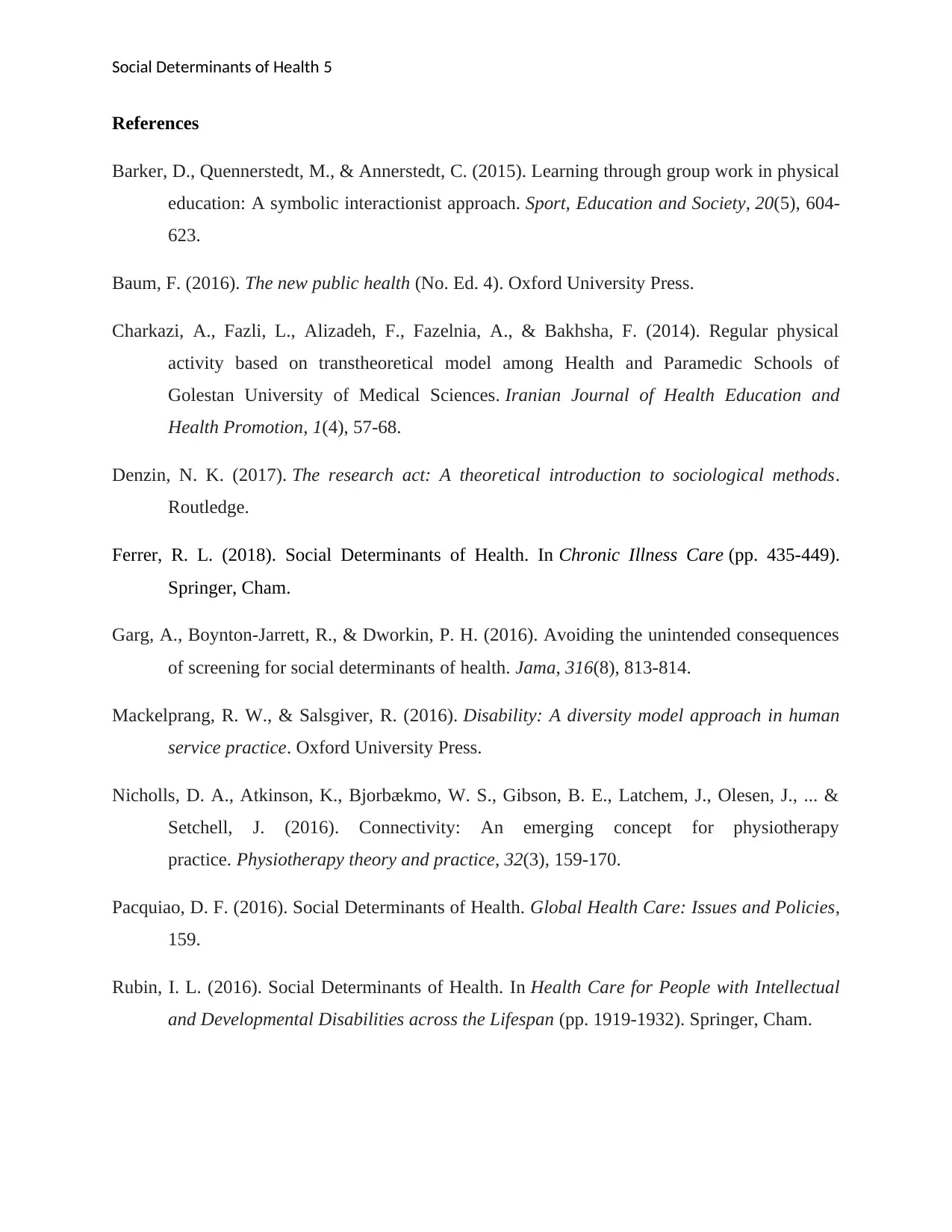
Social Determinants of Health 5
References
Barker, D., Quennerstedt, M., & Annerstedt, C. (2015). Learning through group work in physical
education: A symbolic interactionist approach. Sport, Education and Society, 20(5), 604-
623.
Baum, F. (2016). The new public health (No. Ed. 4). Oxford University Press.
Charkazi, A., Fazli, L., Alizadeh, F., Fazelnia, A., & Bakhsha, F. (2014). Regular physical
activity based on transtheoretical model among Health and Paramedic Schools of
Golestan University of Medical Sciences. Iranian Journal of Health Education and
Health Promotion, 1(4), 57-68.
Denzin, N. K. (2017). The research act: A theoretical introduction to sociological methods.
Routledge.
Ferrer, R. L. (2018). Social Determinants of Health. In Chronic Illness Care (pp. 435-449).
Springer, Cham.
Garg, A., Boynton-Jarrett, R., & Dworkin, P. H. (2016). Avoiding the unintended consequences
of screening for social determinants of health. Jama, 316(8), 813-814.
Mackelprang, R. W., & Salsgiver, R. (2016). Disability: A diversity model approach in human
service practice. Oxford University Press.
Nicholls, D. A., Atkinson, K., Bjorbækmo, W. S., Gibson, B. E., Latchem, J., Olesen, J., ... &
Setchell, J. (2016). Connectivity: An emerging concept for physiotherapy
practice. Physiotherapy theory and practice, 32(3), 159-170.
Pacquiao, D. F. (2016). Social Determinants of Health. Global Health Care: Issues and Policies,
159.
Rubin, I. L. (2016). Social Determinants of Health. In Health Care for People with Intellectual
and Developmental Disabilities across the Lifespan (pp. 1919-1932). Springer, Cham.
References
Barker, D., Quennerstedt, M., & Annerstedt, C. (2015). Learning through group work in physical
education: A symbolic interactionist approach. Sport, Education and Society, 20(5), 604-
623.
Baum, F. (2016). The new public health (No. Ed. 4). Oxford University Press.
Charkazi, A., Fazli, L., Alizadeh, F., Fazelnia, A., & Bakhsha, F. (2014). Regular physical
activity based on transtheoretical model among Health and Paramedic Schools of
Golestan University of Medical Sciences. Iranian Journal of Health Education and
Health Promotion, 1(4), 57-68.
Denzin, N. K. (2017). The research act: A theoretical introduction to sociological methods.
Routledge.
Ferrer, R. L. (2018). Social Determinants of Health. In Chronic Illness Care (pp. 435-449).
Springer, Cham.
Garg, A., Boynton-Jarrett, R., & Dworkin, P. H. (2016). Avoiding the unintended consequences
of screening for social determinants of health. Jama, 316(8), 813-814.
Mackelprang, R. W., & Salsgiver, R. (2016). Disability: A diversity model approach in human
service practice. Oxford University Press.
Nicholls, D. A., Atkinson, K., Bjorbækmo, W. S., Gibson, B. E., Latchem, J., Olesen, J., ... &
Setchell, J. (2016). Connectivity: An emerging concept for physiotherapy
practice. Physiotherapy theory and practice, 32(3), 159-170.
Pacquiao, D. F. (2016). Social Determinants of Health. Global Health Care: Issues and Policies,
159.
Rubin, I. L. (2016). Social Determinants of Health. In Health Care for People with Intellectual
and Developmental Disabilities across the Lifespan (pp. 1919-1932). Springer, Cham.
⊘ This is a preview!⊘
Do you want full access?
Subscribe today to unlock all pages.

Trusted by 1+ million students worldwide
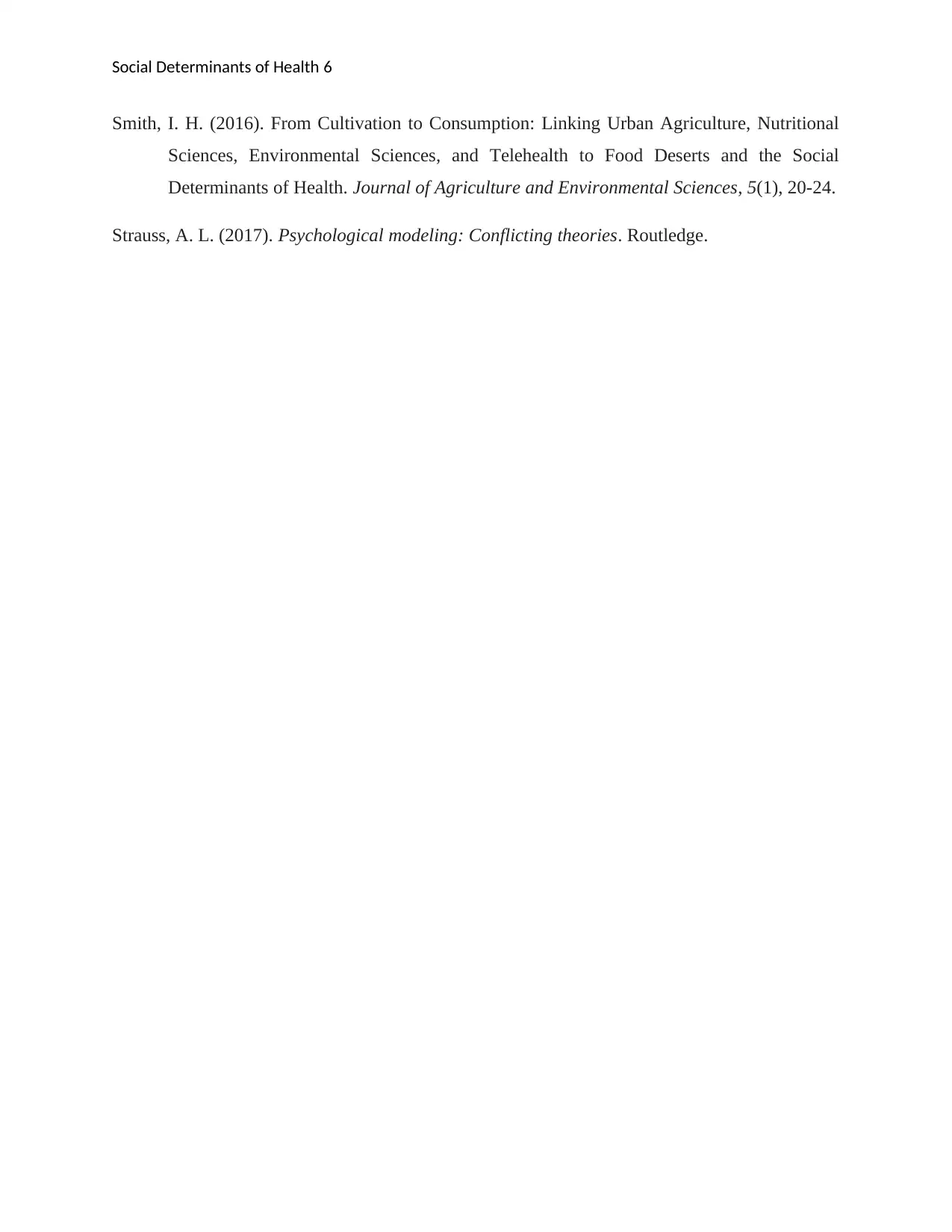
Social Determinants of Health 6
Smith, I. H. (2016). From Cultivation to Consumption: Linking Urban Agriculture, Nutritional
Sciences, Environmental Sciences, and Telehealth to Food Deserts and the Social
Determinants of Health. Journal of Agriculture and Environmental Sciences, 5(1), 20-24.
Strauss, A. L. (2017). Psychological modeling: Conflicting theories. Routledge.
Smith, I. H. (2016). From Cultivation to Consumption: Linking Urban Agriculture, Nutritional
Sciences, Environmental Sciences, and Telehealth to Food Deserts and the Social
Determinants of Health. Journal of Agriculture and Environmental Sciences, 5(1), 20-24.
Strauss, A. L. (2017). Psychological modeling: Conflicting theories. Routledge.
1 out of 7
Related Documents
Your All-in-One AI-Powered Toolkit for Academic Success.
+13062052269
info@desklib.com
Available 24*7 on WhatsApp / Email
![[object Object]](/_next/static/media/star-bottom.7253800d.svg)
Unlock your academic potential
Copyright © 2020–2026 A2Z Services. All Rights Reserved. Developed and managed by ZUCOL.




